June 19, 2025 | 22:03 GMT +7
June 19, 2025 | 22:03 GMT +7
Hotline: 0913.378.918
June 19, 2025 | 22:03 GMT +7
Hotline: 0913.378.918
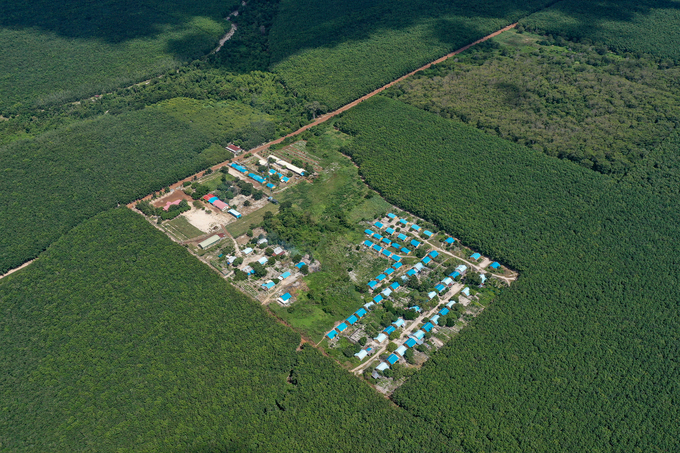
The headquarters and residential area for workers of Mekong Rubber Co., Ltd. Photo: Tung Dinh.
About 60 kilometers from Kampong Thom city, after passing through several barriers, the grounds of Mekong Rubber Co., Ltd. come into view. Situated within neatly arranged, lush green rubber plantations, this area was once the Bang Pe forest more than 10 years ago.
Established in early 2011, Mekong Rubber operates across two Cambodian provinces, Kampong Thom and Preah Vihear. It is considered the youngest among the 16 subsidiaries of VRG operating in seven Cambodian locations.
Over the past 10 years, this desolate, roadless area has transformed into thousands of hectares covered in rubber plantations under the company's management. Mr. Do Quoc Tuan, Director of Mekong Rubber Co., Ltd., shares: "The early days of the company were very challenging. With no roads, we had to use tractors and then walk to survey and demarcate the rubber plots".
Today, the infrastructure has been meticulously developed, with facilities including electricity, water, roads and housing for workers fully equipped. Thanks to this systematic and well-directed investment, Mekong Rubber has been able to attract and retain over 1.100 Cambodian workers, most of whom are from the Kuy ethnic group, after more than 10 years of operation.
Company leaders liken this achievement to the greatest success of Mekong Rubber, as it has transformed local customs. Formerly dependent on nature and practicing shifting cultivation and nomadism, the local people have now learned the art of rubber cultivation. They have come together to build a growing, prosperous and stable community.
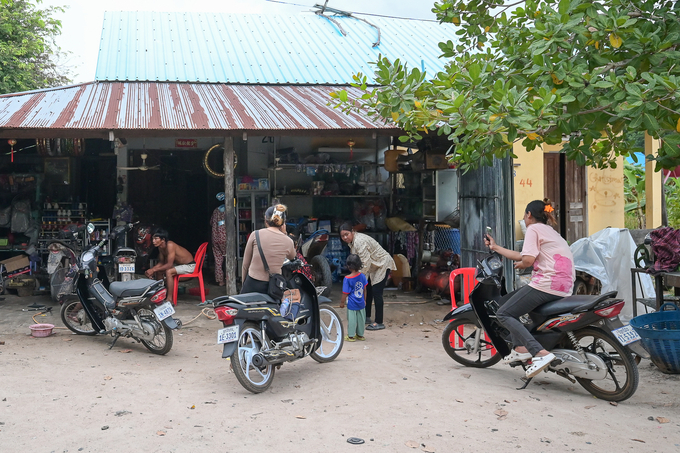
The Cambodian community has formed within the company's housing areas. Photo: Tung Dinh.
Ten years ago, rubber was a new crop in the Bang Pe forest. In addition to investing in infrastructure, Mekong Rubber has implemented a range of policies to attract and retain workers.
"When hiring new employees, during the training period for tapping rubber, workers are paid 18.000 riel/day and provided with tapping knives. Once they become proficient, the company pays them 25.500 riel/day for the first 12 days", said Mr. Nguyen Van Toan, Deputy Director of the company.
If workers meet job expectations, they receive daily wages, attendance bonuses, payments for dry rubber, liquid rubber, as well as allowances for fuel, necessities and even additional holiday bonuses. During holidays and festivals, they not only get time off but also receive an extra allowance of 16,000 riel/day.
Currently, all 1.100 direct employees of Mekong Rubber are Cambodian, with an average monthly income of around 1.2 million riel (approximately 288 USD). This income level is considered high compared to the average wage for workers in Cambodia.
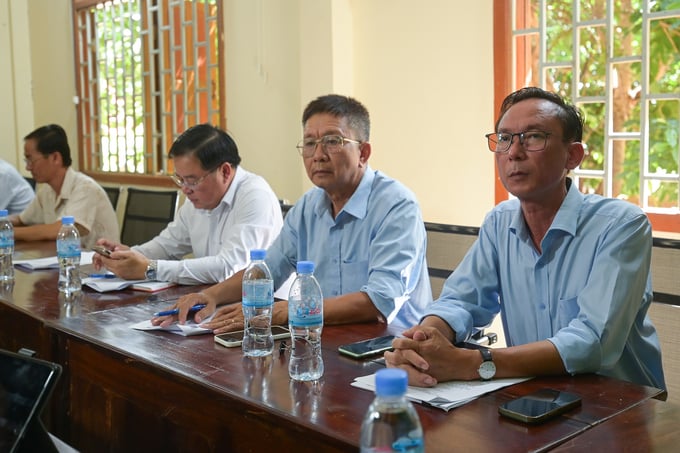
Mr. Nguyen Van Toan, Deputy Director of Mekong Rubber Co., Ltd. (far right), discusses the company's activities. Photo: Tung Dinh.
In addition to their income, workers are provided with housing, personal protective equipment and schooling for their children, including daily transportation. They also receive various types of insurance, such as health insurance, social insurance and accident insurance.
Moreover, to support the spiritual well-being of Cambodian workers, many of whom are Buddhist Kuy people, the company has built a temple, in addition to essential infrastructure like electricity, roads, schools and medical facilities.
As a result, the company's workforce has stabilized and the 5.714 hectares of rubber plantations are fully allocated. On average, each worker is responsible for 6.5 hectares, with a productivity of about 626 trees/worker/tapping session and an annual yield of approximately 10.3 tons of rubber/person.
"To further improve productivity, the company is experimenting with a contract farming model to help workers' families make better use of their labor and increase their income", Mr. Nguyen Van Toan added.
Before the national electricity grid was available, the company used diesel generators to produce electricity. This power not only served the office and staff but was also distributed to workers. Electricity was provided on a scheduled basis, typically from 6 PM to 9 PM and from 4 AM to 7 AM, to support daily activities and cooking for the employees.
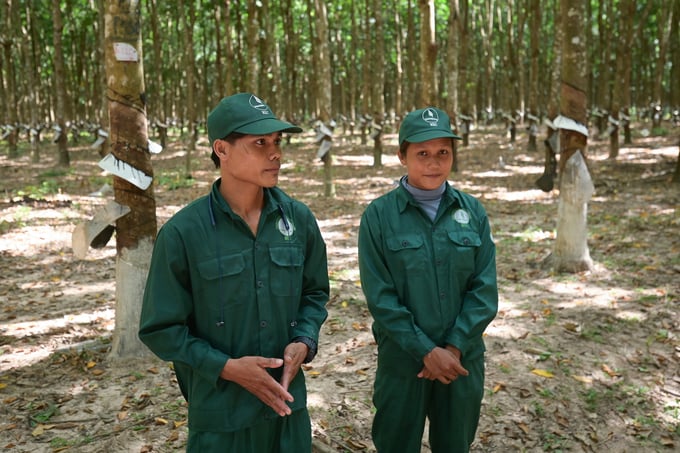
Seng Mea Kara (right) is the top rubber tapper of the company for 2024, alongside Chhoun Choeun (left). Photo: Tung Dinh.
Amidst the shady rubber forest, where temperatures drop by 1 to 2 degrees Celsius compared to the outside, the serene quiet is suddenly interrupted by the sound of a motorcycle. A brand-new Thai Dream motorcycle quickly glided on the internal road and stopped at a worker rest area.
On the motorcycle is a young woman with a bright face, despite bearing the marks of hard work. This is Seng Mea Kara, the top rubber tapper at Mekong Rubber Co., Ltd. for 2024, born in 2003.
Through the company’s interpreter, Mea Kara said that the motorcycle is a reward for being the top performer in the company's recent skills competition held a few months ago. According to Mr. Nguyen Van Toan, this brand-new motorcycle, with a mileage of just over 500 kilometers, was imported fully assembled from Thailand and cost 2.400 USD.
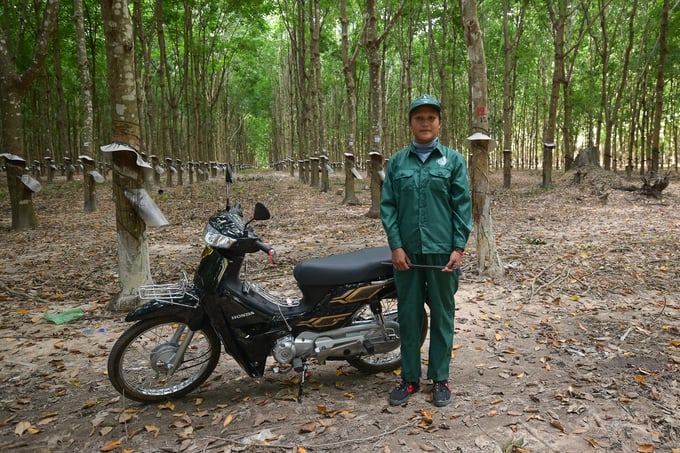
Seng Mea Kara with the Thai-imported Dream motorcycle valued at 2.400 USD, the award for the top performer in the 2024 skills competition. Photo: Tung Dinh.
When asked why she chose to stick with rubber cultivation, Mea Kara said: “Working here, I earn over 1.2 million riel a month, not including bonuses. The company provides housing, and utilities are already available. Plus, I’m living within a community, so I don’t want to go anywhere else".
At 21 years old, a mother of a 2-year-old daughter and the most skilled worker at the company with a salary and bonuses to match, Mea Kara is likely to continue working with rubber for a long time. She has moved beyond the days of shifting cultivation and nomadism that characterized previous generations of her family.
Eight years older than Mea Kara, Chhoun Choeun is a father of three and also a skilled tapper at Mekong Rubber. Since both he and his wife work as employees, their three children live with them in the company-provided housing and attend the company's school.
Choeun said that he and his wife earn between 2.4 and 2.5 million riel per month, which comfortably covers their family's living expenses and allows for additional savings. This level of income was once a dream for many locals who, in the past, were tied to shifting cultivation and seasonal farming, dealing with poor soil and the need to relocate frequently.
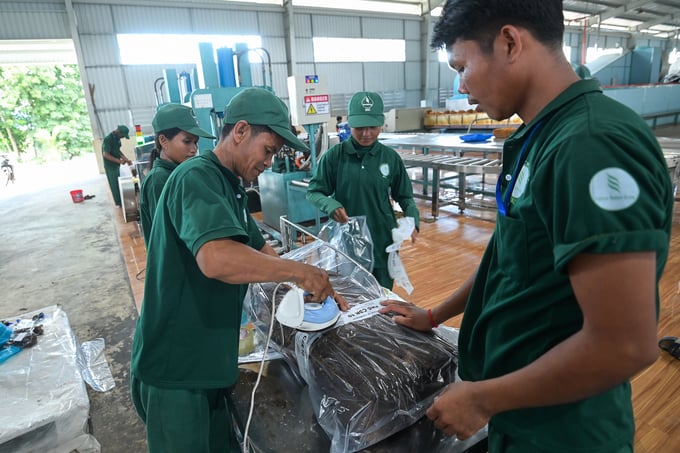
Cambodian youths working at the company's factory. Photo: Tung Dinh.
The reason this young man, born in 1995, chose not to work in Phnom Penh or Thailand is that he receives housing and clean water support, only needing to pay for electricity each month.
Additionally, due to the nature of rubber tapping, a skilled worker can complete their tasks by 8 to 9 AM if they work diligently. On days when they collect latex, they just only need to work an extra 1 to 2 hours.
With the remaining time in the day, they can engage in agricultural activities such as raising livestock or growing rice and cashews to boost their income. This is also why young people like Choeun and Mea Kara choose to stay with rubber cultivation.
Mekong Rubber currently manages 5.714 hectares of rubber plantations, with nearly 4.150 hectares in Kampong Thom and around 1.570 hectares in Preah Vihear. All of these areas have been in production since 2022, with stable yields.
Regarding housing, the company has constructed 114 solid residential units for workers and 13 houses for staff, covering a total area of nearly 10.000 square meters. In the workers' housing area, close-knit communities have formed, complete with various essential services such as grocery stores, repair shops and sports facilities.
Translated by Phuong Linh
![Turning wind and rain into action: [9] Digitizing hydrometeorological data in response to climate change](https://t.ex-cdn.com/nongnghiepmoitruong.vn/608w/files/news/2025/06/17/z6704423696987_15fd32ffc26d590d204d520c9dac6786-nongnghiep-165943.jpg)
(VAN) Farmers have begun accessing hydrometeorological applications to adjust their cropping schedules, aiming to ensure productivity and adapt to climate change.
![Turning wind and rain into action: [8] Real-time salinity detection and early warning technology](https://t.ex-cdn.com/nongnghiepmoitruong.vn/608w/files/news/2025/06/17/z6704423696987_15fd32ffc26d590d204d520c9dac6786-nongnghiep-151127.jpg)
(VAN) Thanks to the integration of modern hydrological-hydraulic models, remote sensing technologies, and artificial intelligence, the accuracy of hydrological forecasting has significantly improved.
![Turning wind and rain into action: [7] Early disaster warnings help marine farmers minimize losses](https://t.ex-cdn.com/nongnghiepmoitruong.vn/608w/files/news/2025/06/17/z6704423696987_15fd32ffc26d590d204d520c9dac6786-nongnghiep-142942.jpg)
(VAN) In recent years, thanks to early disaster warnings and forecasting, marine farmers in Khanh Hoa province have been able to reduce risks and losses, thereby improving production efficiency.
![Turning wind and rain into action: [6] ‘Four on-the-spot’ disaster management software](https://t.ex-cdn.com/nongnghiepmoitruong.vn/608w/files/news/2025/06/17/e5a48259d6a262fc3bb3-nongnghiep-183800.jpg)
(VAN) By simply activating the scenario on the disaster management software, the relevant authorities immediately know how many households need to be evacuated, where to evacuate them to, and by what means of transportation…
![Turning wind and rain into action: [5] Hue applies modern technology in disaster forecasting](https://t.ex-cdn.com/nongnghiepmoitruong.vn/608w/files/news/2025/06/17/z6704423696987_15fd32ffc26d590d204d520c9dac6786-nongnghiep-093938.jpg)
(VAN) In Hue city, modern technology has recently been applied in meteorological and hydrological forecasting and warning, helping to reduce the damage caused by natural disasters.

(VAN) A cutting-edge farming technique being implemented on an experimental ranch in Arizona's Sonoran Desert has already saved a billion gallons of water over five years, according to Civil Eats.

(VAN) Poultry and pig production and the environment can be boosted through enhanced water technology, according to new research.